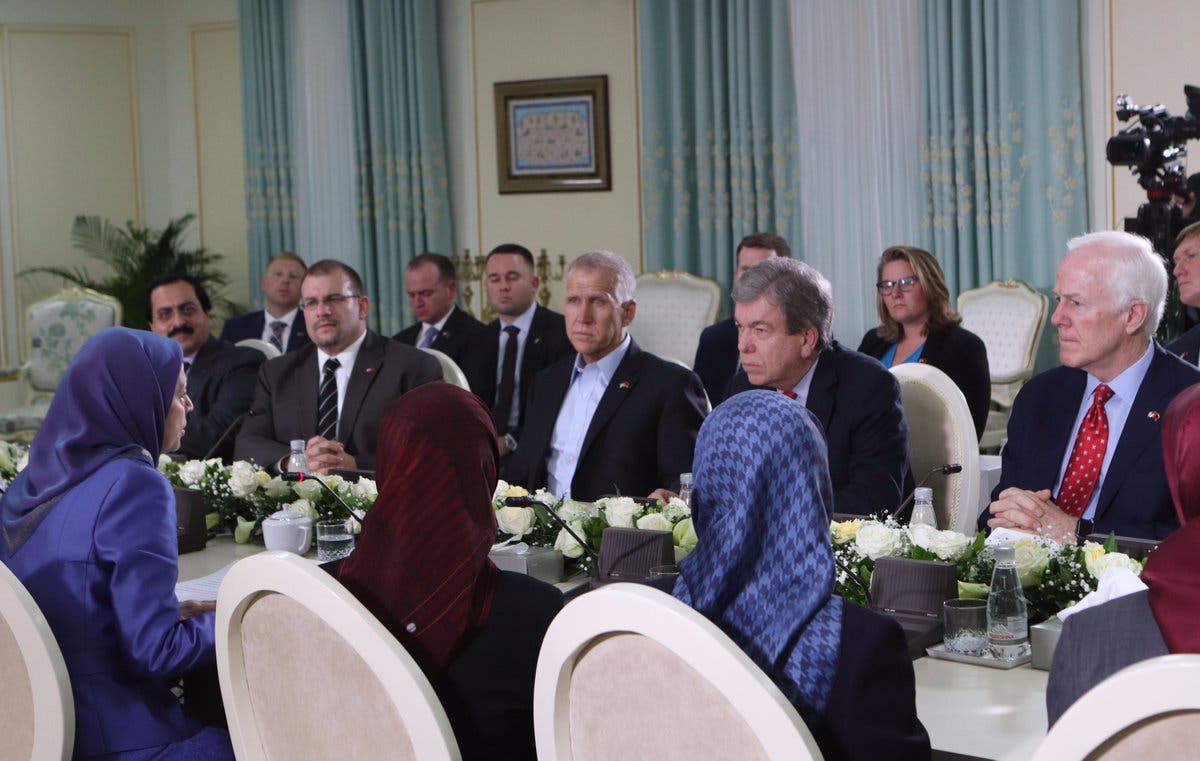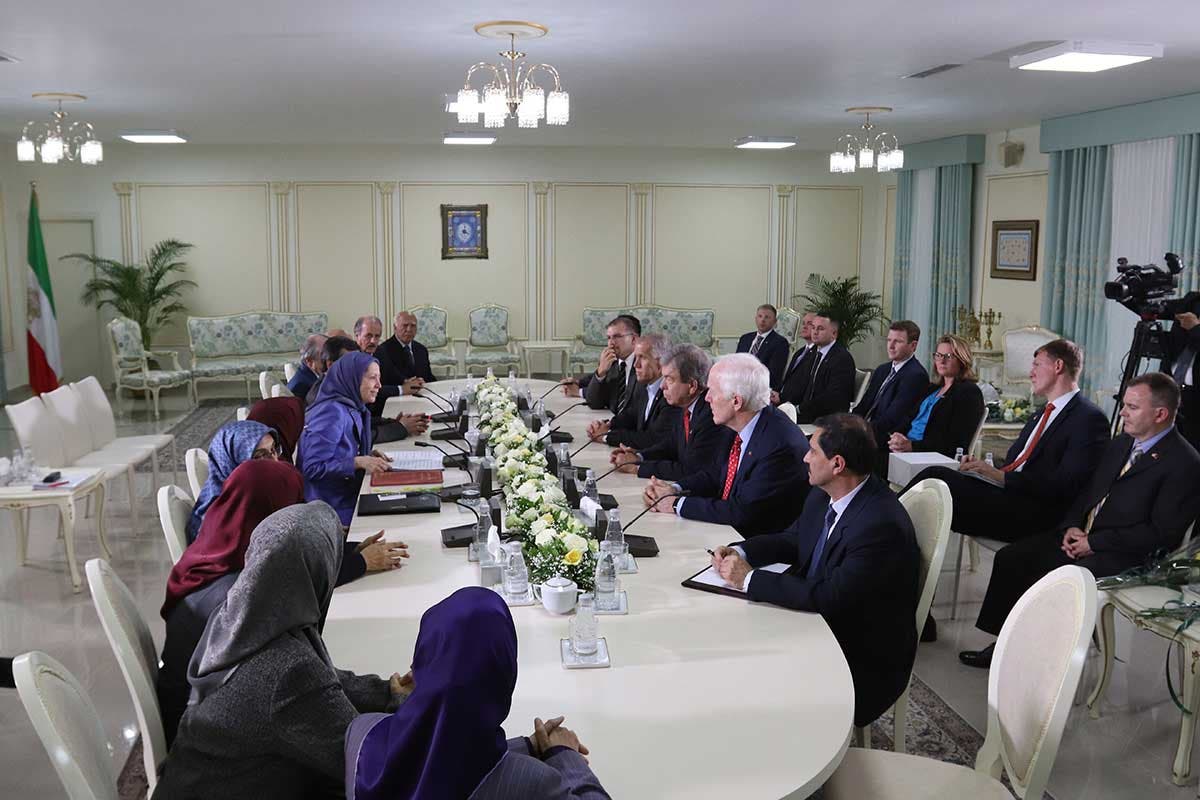All the President’s Men: #Iran’s Cabinet Candidates
While humans lack the ability to see into the future, we do possess the power to analyze our world to predict what the future has in store for us. The result of Iran’s so-called presidential election back in May rendered a second term for the incumbent Hassan Rouhani. During Iran’s short election season, lasting no less than a month, the mullahs’ cunningly downgraded crackdown measures,
decreasing executions and increasing social freedoms to lure the general public into polling stations.
Nevertheless, the all-male slate of cabinet candidates presented by Rouhani to the parliament for approval provides a dark insight of what awaits the Iranian people and the international community. To make a long story short, these are names consisting of former Revolutionary Guards (IRGC) members, hostage takers, executioners, torturers and thieves.
This is a signal of Iran fueling a future of further wars, crackdown, massacres, exporting terrorism and fundamentalism, and killing sprees targeting the region’s nations.
While Iran apologists and the appeasement camp misled the international community to naively describe Rouhani as a smiling “moderate,” his first term rendered over 3,000 executions and went mostly neglected. Knowing the Obama administration desperately needed a legacy-defining foreign policy achievement, Rouhani and the mullahs saw a green light to press the gas pedal on executions.
After deactivating the gallows shortly for the May elections, the mullahs returned to their true nature and resorted to over 100 executions in July alone. This consists of an average of at least one execution every eight hours.
This should be a wake-up call for European states that have banned executions altogether, and yet are willing to signature lucrative economic deals with Tehran, such as Airbus, Total and Renault.
Rouhani’s list of cabinet candidates has raised quite a stir. After providing a variety of promises during his election campaign, he failed to present even a single female minister candidate. Only under a wave of protests and pressures did Rouhani give in to naming three female vice presidents, providing nothing more than symbolic roles.
There are also reports indicating Rouhani ran through his candidates in close coordination with Iranian Supreme Leader Ali Khamenei. This goes against Iranian political norms — Khamenei is known to have a say in a number of specific candidates, including the key ministers of defense, foreign affairs and intelligence.
Anger mounted during his first term over Rouhani’s ironic decision to appoint Mostafa Pourmohammadi as his justice minister. Pourmohammadi is known for his direct role in the notorious 1988 massacre of over 30,000 political prisoners, mostly members and supporter members of the Iranian opposition People’s Mojahedin Organization of Iran (PMOI/MEK).
And while Pourmohammadi is set aside in Rouhani’s second term cabinet, his replacement, Alireza Avaie, is adding insult to injury. Avaie also played a leading role in the 1988 massacre in Khuzestan Province, southwest Iran. The Iranian opposition National Council of Resistance of Iran (NCRI) held a press conference in September unveiling Avaie’s involvement in executions of Younesco Prison in the city of Dezful. The majority of Iran’s Arab community are resident in the country’s southwest regions.
Other names in Rouhani’s cabinet indicate a bleak second term riddled with crackdown measures and going back on all election season promises.
Mohammad Javad Azari Jahromi is appointed to serve as the new minister of communications and information technology. This is an individual who entered the mullahs’ hated Ministry of Intelligence (MOIS) at the age of 21, becoming involved in interrogations, torture and censorship in his early days.
During the 2009 uprising Jahromi was appointed as the MOIS Director of Surveillance. He is known to have expanded this department and his appointment is seen as Rouhani’s attempt to confront the PMOI/MEK’s increasing popularity amongst Iran’s population through social media networks. Iran is known to have a young and very active social media population of over 40 million users.
Amir Hatami is set to become Iran’s new defense minister. Joining the ultraconservative and repressive IRGC Bassij paramilitaries at the age of 12, Hatami is known for his active and enthusiastic participation in the regime’s crackdown and killing campaigns. He is amongst the Bassij members tasked to join Iran’s classic army and quickly rose the ranks to provide the mullahs the influence they sought in this force. Hatami also played an important role in identifying, arresting and eliminating any army member showing even the slightest sign of patriotic devotion and acting against the mullahs’ interests.
Habibollah Beetaraf, Rouhani’s candidate for the new labor minister, was amongst the so-called “college students” who stormed the US Embassy back in 1979 and took 52 American diplomats hostage. He was one of the first IRGC members and participated in literally herding teenagers and even small children into minefields during the Iran-Iraq War of the 1980s.
Iran’s industry, mines and trade will be managed by Mohammad Shariatmadari, famous for actively playing a part in the regime’s crackdown and plundering. He is heavily involved in managing Khamenei’s conglomerate, known as the “Setad Ejraiye Farmane Hazrate Emam” – Headquarters for Executing the Order of the Imam, controlling a large percentage of the regime’s economic empire. $95 billion is this massive entity’s estimated capital.
This lineup provides a dark glimpse into what the future will bring for the Iranian people and neighboring nations. For example, following July’s execution spree, the mullahs’ regime reportedly sent 13 individuals to the gallows on August 10th alone.
This atrocity included 11 hangings in a mass killing in the city of Birjand, eastern Iran; one execution in a small town in northern Iran; and the horrific execution of 20-year-old Alireza Tajiki, arrested at the age of 15 at the time of his alleged crime.
Amnesty International demanding Tehran halt this hanging fell on deaf ears and Iran’s mullahs once again proved their sinister cruelty and lack of respect for any humane values and international laws.
Rouhani’s second term will bring nothing but additional economic and social devastation, parallel to political crackdown, destructive meddling across the region and continuing Iran’s ballistic missile/nuclear drives. Rouhani neither has the will nor intention to bring about any meaningful change in this regime’s foundations, infrastructure, nature or approach.
What else is expected from an individual who for 40 years has actively participated in the regime’s oppression and warmongering. Rouhani was the first Iranian regime official to call for public executions to teach the Iranian people a lesson.
Despite claims otherwise, Rouhani is part and parcel of the mullahs’ establishment, and he, too, seeks to maintain this system intact and in power. Hence, the international community needs to understand no change will emerge from this medieval, reactionary-minded regime.
The Iranian people and their organized opposition finally deserve the support and recognition they have been deprived of for the past four decades.
originally published in the raddingtonreport











